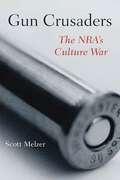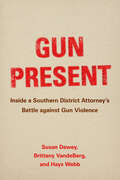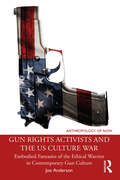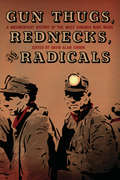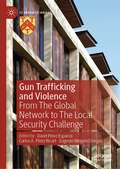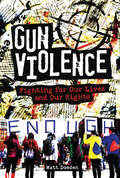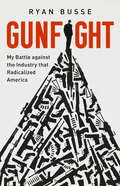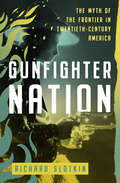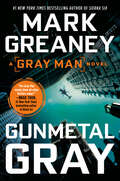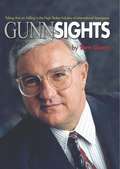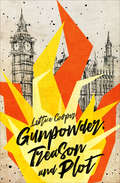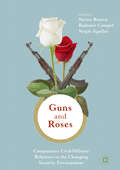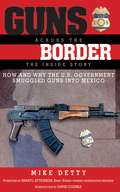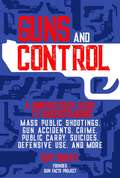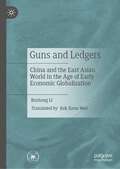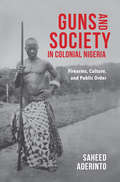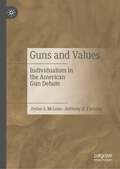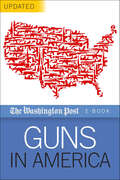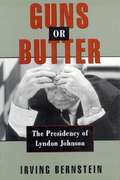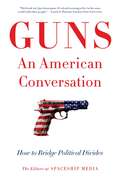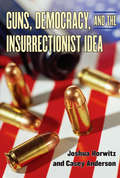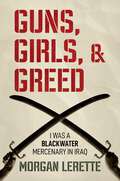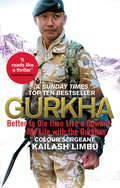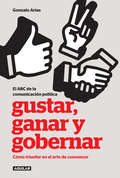- Table View
- List View
Gun Crusaders: The NRA’s Culture War
by Scott MelzerGun Crusaders is a fascinating inside look at how the four-million member National Rifle Association and its committed members come to see each and every gun control threat as a step down the path towards gun confiscation, and eventually socialism. Enlivened by a rich analysis of NRA materials, meetings, leader speeches, and unique in-depth interviews with NRA members, Gun Crusaders focuses on how the NRA constructs and perceives threats to gun rights as one more attack in a broad liberal cultural war. Scott Melzer shows that the NRA promotes a nostalgic vision of frontier masculinity, whereby gun rights defenders are seen as patriots and freedom fighters, defending not the freedom of religion, but the religion of individual rights and freedoms.
Gun Present: Inside a Southern District Attorney's Battle against Gun Violence
by Susan DeweyGun Present takes us inside the everyday operations of the law at a courthouse in the Deep South. Illuminating the challenges accompanying the prosecution of criminal cases involving guns, the three coauthors—an anthropologist, a geographer, and a district attorney—present a deeply human portrait of prosecutors’ work. Built on an immersive, community-based participatory partnership between researchers and criminal justice professionals, Gun Present chronicles how a justice assemblage comprising institutional structures and practices, relationships and roles, and individual moral and emotional worlds informs the day-to-day administration of justice. Weaving together in-depth interviews, quantitative analysis of more than a thousand criminal cases, analysis of trial transcripts, and over a year of ethnographic observations, Gun Present provides a model for scholar-practitioner collaborations.
Gun Rights Activists and the US Culture War: Embodied Fantasies of the Ethical Warrior in Contemporary Gun Culture (Anthropology of Now)
by Joe AndersonGun Rights Activists and the US Culture War is a political anthropology which explores how firearms can become associated with processes of identity formation, as well as acting as symbols of national belonging and embodied safety. In the years following Donald Trump’s election an increasingly polarised population is taking up arms against each other more often than ever before. Based on 12 months of participant observation at gun ranges, activist meetings, handgun courses, and political events, as well as interviews with gun rights activists in San Diego County, this book argues that US conservative identity is saturated with concerns about ethics, gender, and who can wield violence legitimately. The book focuses on two gun rights organisations; the first a conservative, predominantly white and male political action committee; the second a pro-LGBTQ+ firearms training group run by trans women. This book demonstrates how gun ownership gives Americans the perceived means to enact their political will through the threat of, or actual, organized violence, and that this perceived capacity explains why guns remain objects that continue to inspire such devotion and debate. Gun Rights Activists and the US Culture War will be of interest to scholars and students in anthropology, gender studies, ethnic studies, sociology, and politics, as well as a general audience of narrative non-fiction readers.
Gun Rights Activists and the US Culture War: Embodied Fantasies of the Ethical Warrior in Contemporary Gun Culture (Anthropology of Now)
by Joe AndersonGun Rights Activists and the US Culture War is a political anthropology book which explores how firearms can become associated with processes of identity formation, as well as acting as symbols of national belonging and embodied safety.In the years following Donald Trump’s election an increasingly polarised population is taking up arms against each other more often than ever before. Based on 12 months of participant observation at gun ranges, activist meetings, handgun courses, and political events, as well as interviews with gun rights activists in San Diego County, this book argues that US conservative identity is saturated with concerns about ethics, gender, and who can wield violence legitimately. The book focuses on two gun rights organisations; the first a conservative, predominantly white and male political action committee; the second a pro-LGBTQ+ firearms training group run by trans women. This book demonstrates how gun ownership gives Americans the perceived means to enact their political will through the threat of, or actual, organized violence, and that this perceived capacity explains why guns remain objects that continue to inspire such devotion and debate.Gun Rights Activists and the US Culture War will be of interest to scholars and students in anthropology, gender studies, ethnic studies, sociology, and politics, as well as a general audience of narrative non-fiction readers.
Gun Thugs, Rednecks, and Radicals: A Documentary History of the West Virginia Mine Wars
by David Alan CorbinTelling the powerful story of the West Virginia coal mining rebellions of the early 20th century, this book collects material from the leaders, the miners, and the journalists sent to report on the 1912 and 1921 West Virginia mine wars—explosive examples of strikes and union battles. Featured in the text are articles, speeches, and discussions between union leaders such as Samuel Gompers, Frank Keeney, Fred Mooney, Bill Blizzard, and Mother Jones. Also included are U.S. Senate committee testimonies from miners and their family members describing life and work in the coal camps and explaining their participation in the violence. These facts clearly portray the human cost of industry and present the hard choices of a rebellious and often politically radical populace who refuses to be beleaguered under any circumstances.
Gun Trafficking and Violence: From The Global Network to The Local Security Challenge (St Antony's Series)
by David Pérez Esparza Carlos A. Pérez Ricart Eugenio Weigend VargasThis edited book addresses the issues of gun trafficking and gun violence across different regions of the world, including the Americas, Africa, Asia, Europe and Oceania. It seeks to identify global key trends on gun trafficking and related violence and discuss different enforcement measures. Each chapter is written by teams of distinguished academics and/or experienced practitioners to include practitioner insights and policy proposals on issues related to gun violence and gun trafficking. Chapters offer an overview of violence and recent gun control debates in the regions, enumerate challenges, provide lessons learnt, and recommend policy solutions. An overview of the global small arms trade is provided at the beginning alongside a comparative analysis of common challenges and significant differences across the regions. This book speaks to those in Criminology, International Relations, Public Policy, International Security, Public health and Law, and to civil society organizations, think tanks, research centers, policy analysts and policy makers involved in gun control debates.
Gun Violence: Fighting for Our Lives and Our Rights (Usa Today's Debate: Voices And Perspectives Ser.)
by Matt DoedenIn early 2018, teen-led March for Our lives events across the United States protested gun violence, demanded change to save lives, and registered voters toward that end. This authoritative exploration of guns, gun violence, and gun control explores the Second Amendment, the history of guns and gun laws in the United States, legal restrictions to gun ownership, and the devastation of mass shootings. Through an objective look at individual versus collective rights, readers will be able to offer well-informed answers to questions such as should young people own assault rifles? What about terrorists and the mentally ill? Read the book to make an informed argument and support your point of view.
Gunfight: My Battle Against the Industry that Radicalized America
by Ryan BusseA former firearms executive pulls back the curtain on America's multibillion-dollar gun industry, exposing how it fostered extremism and racism, radicalizing the nation and bringing cultural division to a boiling point. As an avid hunter, outdoorsman, and conservationist–all things that the firearms industry was built on–Ryan Busse chased a childhood dream and built a successful career selling millions of firearms for one of America&’s most popular gun companies.But blinded by the promise of massive profits, the gun industry abandoned its self-imposed decency in favor of hardline conservatism and McCarthyesque internal policing, sowing irreparable division in our politics and society. That drove Busse to do something few other gun executives have done: he's ending his 30-year career in the industry to show us how and why we got here. Gunfight is an insider&’s call-out of a wild, secretive, and critically important industry. It shows us how America's gun industry shifted from prioritizing safety and ethics to one that is addicted to fear, conspiracy, intolerance, and secrecy. It recounts Busse's personal transformation and shows how authoritarianism spreads in the guise of freedom, how voicing one's conscience becomes an act of treason in a culture that demands sameness and loyalty. Gunfight offers a valuable perspective as the nation struggles to choose between armed violence or healing.
Gunfighter Nation: The Myth of the Frontier in Twentieth-Century America (Mythology of the American West)
by Richard SlotkinNational Book Award Finalist: The &“impressive&” conclusion to the &“magisterial trilogy on the mythology of violence in American history&” (Film Quarterly). &“The myth of the Western frontier—which assumes that whites&’ conquest of Native Americans and the taming of the wilderness were preordained means to a progressive, civilized society—is embedded in our national psyche. U.S. troops called Vietnam &‘Indian country.&’ President John Kennedy invoked &‘New Frontier&’ symbolism to seek support for counterinsurgency abroad. In an absorbing, valuable, scholarly study, [the author] traces the pervasiveness of frontier mythology in American consciousness from 1890. . . . Dime novels and detective stories adapted the myth to portray gallant heroes repressing strikers, immigrants and dissidents. Completing a trilogy begun with Regeneration Through Violence and The Fatal Environment, Slotkin unmasks frontier mythmaking in novels and Hollywood movies. The myth&’s emphasis on use of force over social solutions has had a destructive impact, he shows.&” —Publishers Weekly &“Stirring . . . Breaks new ground in its careful explication of the continuing dynamic between politics and myth, myth and popular culture.&” —The New York Times &“A subtle and wide-ranging examination how America&’s fascination with the frontier has affected its culture and politics. . . . Intellectual history at its most stimulating—teeming with insights into American violence, politics, class, and race.&” —Kirkus Reviews
Gunmetal Gray (Gray Man #6)
by Mark GreaneyMark Greaney, the #1 New York Times bestselling coauthor of Tom Clancy’s Jack Ryan novels, delivers another breakneck thriller following the world’s deadliest assassin—the Gray Man… After five years on the run Court Gentry is back on the inside at the CIA. But his first mission makes him wish he had stayed on the outs when a pair of Chinese agents try to take him down in Hong Kong. Normally the Chinese prefer to stay eyes-only on foreign agents. So why are they on such high alert? Court’s high stakes hunt for answers takes him across Southeast Asia and leads to his old friend, Donald Fitzroy, who is being held hostage by the Chinese. Fitzroy was contracted to find Fan Jiang, a former member of an ultra-secret computer warfare unit responsible for testing China’s own security systems. And it seems Fan may have been too good at his job—because China wants him dead. The first two kill teams Fitzroy sent to find Fan have disappeared and the Chinese have decided to “supervise” the next operation. What they don't know is that Gentry’s mission is to find Fan first and get whatever intel he has to the US. After that, all he has to do is get out alive...
Gunn Sights
by Tom GunnTom Gunn had a life-altering career change in 1975 when he went from an eight-year stint as staff lawyer with the U.S. Senate to a job in aerospace sales and marketing at McDonnell Douglas. He knew a lot about military appropriations and classified developments, but almost nothing about marketing. Over the next twenty-two years, however, Gunn and the team he assembled developed a process for strategic selling and marketing that delivered $250 billion in sales of military and commercial aircraft, missiles, space systems, and logistic support, against strong and at times cutthroat domestic and international competition. His book is both the story of that success and a handbook for anyone who wants to learn about high-powered selling, about assessing the competition and understanding the customer, and about using a defined process to shape strategic planning. Gunn details that process step by step, outlines cultural traps overseas and political realities at home, and makes his points in selected case studies.
Gunpowder, Treason and Plot
by Lettice CooperThe acclaimed author of The New House brings to life the 1605 plot to blow up the House of Lords and assassinate King James I in a vividly imagined novel. “Please to remember, The Fifth of November, Gunpowder, treason and plot.” —Traditional English Rhyme The legend of Guy Fawkes and the infamous Gunpowder Plot is a deeply rooted part of English identity. The fateful events of November 5, 1605 are still celebrated across the country with bonfires, sparklers, and the now-ubiquitous Guy Fawkes mask. But few revelers know the real story behind one of the most infamous conspiracies ever attempted. How did a small band of Catholic conspirators organize such an audacious plot? Were they noble freedom fighters or merely seventeenth century terrorists? In this meticulously researched historical novel, Lettice Cooper conjures the desperation and danger behind one of the most significant events in modern history.
Guns & Roses: Comparative Civil-Military Relations in the Changing Security Environment
by Steven Ratuva Radomir Compel Sergio AguilarThis edited volume provides a critical and comparative discussion of the changing synergy between the military and society in the dramatically transforming global security climate, drawing on examples from the Asian, Pacific, African, Middle Eastern, European and South American regions. The book is interdisciplinary and covers wide-ranging issues relating to civil military relations, democratization, regional security, ethnicity, peace-building and peace keeping, civilian oversight, internal repression, gender, regime change and civil society.
Guns Across the Border: How and Why the U.S. Government Smuggled Guns into Mexico: The Inside Story
by Mike DettyConducted under the umbrella of Project Gunrunner, intended to stem the flow of firearms to Mexico, the Bureau of Alcohol, Tobacco, Firearms, and Explosives (ATF) ran a series of “gun walking” sting operations, including Operations Wide Receiver and Operation Fast & Furious. The government allowed licensed gun dealers to sell weapons to illegal straw buyers so that they could continue to track the firearms as they were transferred to higher-level traffickers and key figures in Mexican cartels.Motivated by a sense of patriotic duty, Tucson gun dealer and author Mike Detty alerted the local ATF office when he was first approached by suspected cartel associates. Detty made the commitment and assumed the risks involved to help the feds make their case, often selling guns to these thugs from his home in the dead of night. Originally informed that the investigation would last just weeks, Detty’s undercover involvement in Operation Wide Receiver, the precursor to Operation Fast & Furious, which was by far the largest “gun walking” probe, stretched on for an astonishing and dangerous three years.Though the case took several twists and turns, perhaps the cruelest turn was his betrayal by the very agency he risked everything to help.
Guns and Control: A Nonpartisan Guide to Understanding Mass Public Shootings, Gun Accidents, Crime, Public Carry, Suicides, Defensive Use, and More
by Guy SmithA Nonpartisan guide that arms both sides of the gun control debate. The slogan of the Gun Facts Project is &“We are neither pro-gun nor anti-gun. We are pro-math and anti-BS.&” From project creator Guy Smith comes Guns and Control: A Nonpartisan Guide to Mass Public Shootings, Gun Accidents, Crime, Public Carry, Suicides, Defensive Use, and More. No matter what side of the aisle one is on, people are baffled by gun control. This book is designed to be a guide to thoughtful discussion; it arms readers with facts and the logic behind conflicting arguments and leaves emotional rhetoric to the pundits and focuses on the thorny issues of the debate. Guns and Control will: • Guide readers step-wise through each of the major gun control topics: mass public shootings, assault weapons, street crime, suicide, private carry, defensive gun use, gun availability, and more. • Help readers gain the broad perspective and the full set of important, true facts, just in time for the 2020 Presidential Election. • Arm readers against some of the more egregious misinformation. • Support readers in formulating their own conclusions.Guns and Control will grant high-level perspectives—for example, that mass public shootings are a global phenomenon, occurring in nearly all developed nations—and explore details to understand the causes, and thus possible cures, of gun violence-related problems. Was the push for de-institutionalization in mental health management a contributing factor to the rise in mass public shootings? Guns and Control will help readers find answers to such questions. What the public lacks is a clear, unbiased, broad perspective on the realities of guns, explained in simple, straightforward, and entertaining ways. Guns and Control will demystify these misunderstood aspects of who uses and misuses guns.
Guns and Ledgers: China and the East Asian World in the Age of Early Economic Globalization
by Bozhong LiThis book seeks to reconcile the dual forces of war and economic globalization in tracing China's early modernity. For late imperial China, there were two forms of encounter with the West; the guns of invading Europeans, and the ledgers by which trade between China and the West was measured and regulated. Even today, China's reactions to the West oscillate between business-driven openness and military paranoia. In this intellectual tour de force, Bozhong Li, one of China's preeminent intellectual and economic historians, traces the unprecedented transition that led China into the modern world; the book will be of value for economists, historians, and sinophiles alike.
Guns and Society in Colonial Nigeria: Firearms, Culture, and Public Order
by Saheed AderintoGuns are an enduring symbol of imperialism, whether they are used to impose social order, create ceremonial spectacle, incite panic, or to inspire confidence. In Guns and Society, Saheed Aderinto considers the social, political, and economic history of these weapons in colonial Nigeria. As he transcends traditional notions of warfare and militarization, Aderinto reveals surprising insights into how colonialism changed access to firearms after the 19th century. In doing so, he explores the unusual ways in which guns were used in response to changes in the Nigerian cultural landscape. More Nigerians used firearms for pastime and professional hunting in the colonial period than at any other time. The boom and smoke of gunfire even became necessary elements in ceremonies and political events. Aderinto argues that firearms in the Nigerian context are not simply commodities but are also objects of material culture. Considering guns in this larger context provides a clearer understanding of the ways in which they transformed a colonized society.
Guns and Values: Individualism in the American Gun Debate
by Anthony K. Fleming Dylan S. McLeanThe American gun control debate is best understood as a battle in a war over the influence of individualism on American culture, politics, and policy. This book demonstrates that the gun debate is fundamentally about values. Specifically, it is about what we value most: private rights, or the public good. This helps explain why the technical, empirical, or legalistic arguments we hear aren’t persuasive. A review of scholarly literature on both the politics of gun control and American political culture finds an American bias toward an individualism that embraces personal rights. We argue that this bias stacks the deck against gun control. Interviews we conducted with activists show that support for, or opposition to, gun control is linked to concern for the public, or private, good. Finally, we trace the federal gun control debate in Washington from the 1960s to 2010s to show the ebbs and flows of individualism’s influence.
Guns in America
by The Washington PostIn the aftermath of the Sandy Hook Elementary tragedy, The Washington Post investigates America's complicated relationship with guns.Wayne LaPierre, the leader of the National Rifle Association, calls gun control "the fight of the century." For more than a year, The Washington Post examined the long, bloody history of gun control in America, an investigation that was reopened and expanded after the massacre of first-graders in Newtown, Connecticut.With new reporting on the state of gun reform in the aftermath of Newtown, including how the families are recovering and the dangers represented by new technologies such as 3D printing, this updated eBook shines a light on the hidden life of guns in the United States. From the power of the NRA and its war over the Second Amendment, to US guns fueling the drug war along the Mexican border, the prize-winning journalists of the Washington Post reveal the politics and the passions behind the continuing gun control debate.
Guns or Butter: The Presidency of Lyndon Johnson
by Irving BernsteinThe presidency of Lyndon Johnson was a pivotal moment in twentieth-century American history. From the decisive social programs of the Great Society, to the triumph of the Civil and Voting Rights Acts, to the catastrophe of the Vietnam War and domestic unrest, it was an era of dramatic accomplishment and wrenching tragedy. In Guns or Butter, renowned historian Irving Bernstein brings those five climactic years of the sixties vividly to life, from the moment Lee Harvey Oswald aimed a rifle from the window of the Texas School Depository to the tense ballot-counting that put Richard Nixon in the White House in 1968. Bernstein's book is a narrative masterpiece, filled with sharply drawn character sketches and swiftly moving accounts of events that range from deals cut in the Senate cloakroom, to police charging after protesters on the streets of Selma, to Vietcong commandos bursting into the American embassy in Saigon. We see Johnson ordering aides Bill Moyers and Richard Goodwin to strip and join him for a skinny-dip in the White House pool, where they formulate the Great Society. And we see a tired, distracted president pacing in his bathrobe around a table model of the besieged Khe Sanh garrison, examining aerial photographs and casualty reports. Equally important, Bernstein offers a deft assessment of Johnson's successes and failures, from his legislative programs to his futile pursuit of the war in Vietnam to his failure to boost Hubert Humphrey's presidential campaign in 1968. The author not only retells the maneuvering that brought the president's plans into law, he also analyzes and explains their impact, from the Voting Rights Act to Medicare. The Great Society, Bernstein concludes, was a triumph, but Johnson's attempt to have both guns and butter, to pursue massive domestic initiatives together with a bitter undeclared war, led to runaway inflation that ultimately undermined his presidency. From the dark moments after Kennedy's assassination in 1963, to the heady days of legislative victories of 1965, to the bloody crescendo of riots, assassinations, and military battles in 1968, Johnson's administration was a defining moment in modern American history. In Guns or Butter, Irving Bernstein brilliantly captures both the events and the meaning of those momentous years. Aside from its historical value, this book has major current significance. The legislative program Newt Gingrich and his Republican colleagues introduced in 1995 was designed to repeal the Great Society. Before doing so, members of Congress and the interested public should understand Lyndon Johnson's vision and the legislation that was enacted during the sixties. Guns or Butter provides that critical information.
Guns, An American Conversation: How to Bridge Political Divides
by The Editors at Spaceship MediaBased on an article by Pulitzer Prize–winning reporters, the fascinating results of an important nationwide conversation about guns: Can complete strangers representing every point along the political divide engage in civil and productive discourse on the topic of gun control?As Americans, we spend a lot of time talking about guns. We have arguments, protests, declarations, and slogans about what kind of weapons can be sold and to whom. But the one thing we rarely have when it comes to firearms is a real conversation, and not just with members of our own tribe, but with people whose ideas don&’t align with ours. That is perhaps why the country is so divided when it comes to reducing gun violence. Guns, an American Conversation follows up on a handful of strangers—teachers and gun-rights advocates, hunters and police officers, mothers and fathers across the United States—brought together in a larger group of 150 people, for a month-long moderated Facebook group chat. The goal of the project—which expanded on earlier efforts—was to foster a civil, yet honest, dialogue between people whose backgrounds and beliefs led them to have opposing views on the issue. Not just a journalistic account, Guns attempts to map out common territory in a nation driven by profound divides. It includes sidebars, charts, and graphics that list additional information about gun control in the United States and provide the reader with tools to continue the discussion in their own lives. This book might not change your mind about gun control, but it will help you learn to cross divides in conversation.
Guns, Democracy, and the Insurrectionist Idea
by Joshua Horwitz Casey AndersonThe NRA steadfastly maintains that the 30,000 gun-related deaths and 300,000 assaults with firearms in the United States every year are a small price to pay to guarantee freedom. As former NRA President Charlton Heston put it, "freedom isn't free." And when gun enthusiasts talk about Constitutional liberties guaranteed by the Second Amendment, they are referring to freedom in a general sense, but they also have something more specific in mind---freedom from government oppression. They argue that the only way to keep federal authority in check is to arm individual citizens who can, if necessary, defend themselves from an aggressive government. In the past decade, this view of the proper relationship between government and individual rights and the insistence on a role for private violence in a democracy has been co-opted by the conservative movement. As a result, it has spread beyond extreme "militia" groups to influence state and national policy. In Guns, Democracy, and the Insurrectionist Idea, Josh Horwitz and Casey Anderson reveal that the proponents of this view base their argument on a deliberate misreading of history. The Insurrectionist myth has been forged by twisting the facts of the American Revolution and the founding of the United States, the denial of civil rights to African-Americans after the Civil War, and the rise of the Third Reich under Adolf Hitler. Here, Horwitz and Anderson set the record straight. Then, challenging the proposition that more guns equal more freedom, they expose Insurrectionism---not government oppression---as the true threat to freedom in the U. S. today. Joshua Horwitz received a law degree from George Washington University and is currently a visiting scholar at the Johns Hopkins Bloomberg School of Public Health. He is Executive Director of the Coalition to Stop Gun Violence and the Educational Fund to Stop Gun Violence. He has spent nearly two decades working on gun violence prevention issues. He lives in Arlington, Virginia. Casey Anderson holds a law degree from Georgetown University and is currently a lawyer in private practice in Washington, D. C. He has served in senior staff positions with the U. S. Congress, the Coalition to Stop Gun Violence, and Americans for Gun Safety. He lives in Arlington, Virginia.
Guns, Girls, and Greed: I Was a Blackwater Mercenary in Iraq
by Morgan LeretteGuns, Girls, and Greed is an unvarnished, behind-the-scenes, tell-all account of the scathing and dangerous life of mercenaries at war in Iraq.Experience the world of private contractors conducting high-threat missions for a nascent Iraqi government in the hopes of rebuilding after the fall of Saddam Hussein. With limited support, the men of Blackwater protected US diplomats as the country descended into sectarian violence. It was a hazardous mission complete with rockets, mortars, improvised explosive devices, and not knowing who or where the enemy was. Morgan Lerette&’s irreverently honest memoir shows the good and bad of injecting private armies into active combat zones in the name of diplomacy and digs deep into the bonds of brotherhood created by war. With gut-wrenching tragedy, dark humor, and parties that make Animal House seem like a Disney film, this memoir offers a firsthand perspective on how men act and react in war. Lerette, a private contractor employed by the notorious Blackwater in the early days of the Iraq War, pulls no punches in calling out the incompetence of both the US military and the Department of State during the collapse of Iraq. You can decide if the insertion of private contractors in Iraq assisted or detracted from the war effort and if the costs in blood and treasure were worth the carnage.
Gurkha: Better to Die than Live a Coward: My Life in the Gurkhas
by Colour-Sergeant Kailash LimbuIn this Sunday Times Top Ten bestselling memoir that 'reads like a thriller', (Joanna Lumley) Colour-Sargent Kailash Limbu shares a riveting account of his life as a Gurkha soldier-marking the first time in its two-hundred-year history that a soldier of the Brigade of Gurkhas has been given permission to tell his story in his own words.In the summer of 2006, Colour-Sargeant Kailash Limbu's platoon was sent to relieve and occupy a police compound in the town of Now Zad in Helmand. He was told to prepare for a forty-eight hour operation. In the end, he and his men were under siege for thirty-one days - one of the longest such sieges in the whole of the Afghan campaign.Kailash Limbu recalls the terrifying and exciting details of those thirty-one days - in which they killed an estimated one hundred Taliban fighters - and intersperses them with the story of his own life as a villager from the Himalayas. He grew up in a place without roads or electricity and didn't see a car until he was fifteen.Kailash's descriptions of Gurkha training and rituals - including how to use the lethal Kukri knife - are eye-opening and fascinating. They combine with the story of his time in Helmand to create a unique account of one man's life as a Gurkha. 'I was completely bowled over by Kailash's book and read it with a beating heart and dry mouth. I felt as though I was at his side, hearing the shells and bullets, enjoying the jokes and listening in the scary dead of night. The skill with which he has included his childhood and training is immense, always discovered with ease in the narrative: it actually felt as though I was watching, was IN a film with him. It brought me nearer than I have ever been not only to the mind of the universal soldier but to a hill boy of Nepal and a hugely impressive Gurkha. I raced through it and couldn't put it down: it reads like a thriller. If you want to know anything about the Gurkhas, read this book, and be prepared for a thrilling and dangerous trip' Joanna Lumley
Gustar, ganar y gobernar: Como triunfar en el arte de convencer
by Gonzalo AriasHerramienta indispensable para dirigentes y militantes de todos los niveles, ideologías y partidos que quieran aprovechar el potencial de la comunicación política en el siglo XXI. Hoy más que nunca, quien aspire a gobernar sabe que su poder depende de la construcción de un relato creíble y emotivo que persuada a la ciudadanía. Con hilos a menudo invisibles, la comunicación política mezcla en su trama realidad y ficción para construir y sostener candidatos y planes de gobierno. Para dirigentes y militantes de todos los niveles, ideologías y partidos, para los interesados en la política y hasta para quienes la desprecian, Gonzalo Arias explica al detalle el rol de los consultores, la importancia de las encuestas, los tipos de campañas y todos los entretelones de muchas de las estrategias comunicacionales. Este libro brinda ejemplos de éxitos y fracasos rutilantes sobre cómo diseñar la estrategia comunicacional y llegar a los votantes en cualquier contexto y lugar con todos los medios a nuestro alcance: de las encuestas a la tele, de las redes a los rumores. Gustar, ganar y gobernar, antes que juzgar, apunta a exhibir en toda su dimensión el funcionamiento de la comunicación política en el siglo XXI y a aprovechar su potencial.
